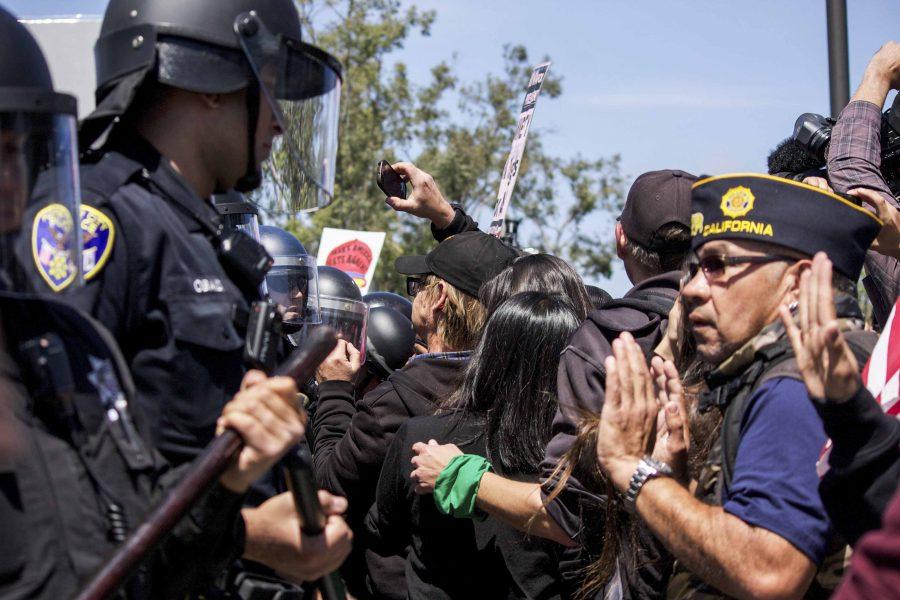Analysis: Now, nothing between Trump, and GOP title, and Clinton
May 4, 2016
Once unthinkable, Donald Trump now is the Republican Party’s presumptive nominee for president.
That became a certainty Tuesday as he crushed rival Ted Cruz in Indiana, drove the Texas senator out of the race, and set the course to clinch the needed delegates in the next few weeks.
The nomination of the brash man with no political experience sets the party and the nation on a collision course with all-but-certain Democratic nominee Hillary Clinton, herself an unprecedented choice of a major party.
And it will be a jarring campaign, underscored anew Tuesday as Trump lashed out at his last GOP rival even en route to defeating him, accusing his father of playing some role in the assassination of JFK.
Now assured of a first ballot nomination at the GOP convention in July, Trump has shattered the rules of how a prospective president should look, talk, behave and campaign _ making the general election run, likely against Clinton, unpredictable, vicious and volatile.
There’s never, in modern times, been a candidate such as Trump. He’d never run for elective office. He largely funded his own effort. He spewed gaffes and lived _ and proudly boasted about _ the sort of glamorous, amorous lifestyle that for years had doomed other candidates. He unapologetically insulted and offended women, Mexican-Americans and the leaders of his own party. Democrats were almost giddy Tuesday at the prospect of running against the billionaire businessman. “Trump spreads hate,” tweeted Debbie Wasserman Schultz, Democratic Party chairwoman, “and we will defeat him in November.”
Trump turned his attention immediately to Democratic front-runner Hillary Clinton, as his campaign began seriously considering vice presidential running mates. “We’re going after Hillary Clinton, she will not be a great president, she will not be a good president, she will be a poor president,” he told supporters.
Cruz, the last best hope of Republican insiders desperate to stop Trump, was a beaten man Tuesday. He put everything he had into Indiana, picking Carly Fiorina as a running-mate, getting rival John Kasich to stop campaigning in the state and securing the backing of Gov. Mike Pence.
Nothing worked. Network exit polls showed Trump winning among men and women, virtually all age groups, even among the born-again and evangelical voters Cruz had courted so assiduously. Just as he had in states across the nation.
“Together we left it all on the field in Indiana,” Cruz told supporters Tuesday night. “We gave it everything we got. But the voters chose another path and so with a heavy heart but with boundless optimism for the long-term future of our nation we are suspending our campaign.”
Kasich remains in the race, but as an afterthought. Chief strategist John Weaver tweeted, “CA here we come.” Kasich, though, has 153 convention delegates while Trump has 1,047, or 190 short of the 1,237 needed to nominate.
“He clearly understands where the race is, but until Trump hits 1,237 he’ll be part of the race,” said veteran New Hampshire GOP activist Tom Rath, a Kasich backer. The party now finds itself in an arranged marriage with Trump, who just hours before was branded by Cruz “utterly amoral,” and a “pathological liar.” Republican 2012 nominee Mitt Romney in March called Trump “a phony, a fraud.”
Yet voters keep embracing Trump. Indiana was Trump’s seventh straight primary win, and he kept gaining strength. Chances were that ball would keep rolling. “Psychologically, people are drawn to a winner and want to be with them,” said Sal Russo, a Sacramento, Calif.-based Republican strategist.
Now come new challenges. The first: Can the Republican establishment rally around its nominee? There’s been no candidate in modern times such as Trump, no one who has so consistently infuriated and alienated party officials, no one with virtually no ties to any Republican in Congress or past presidential administrations.
Trump had warmer words for Cruz Tuesday night, saying he was “one tough competitor” with an “amazing future.” Some insiders have been coming around. “There’s a lot about Donald Trump that I don’t like, but I’ll vote for Trump over Hillary any day,” said Ari Fleischer, a White House press secretary for George W. Bush, in a tweet.
Political veteran Paul Manafort has been meeting regularly with Washington insiders, trying to sell Trump as someone they can do business with. Democrats have a different dilemma. Trump’s triumphs have been in every region of the county, suggesting it’s hard to predict where the 2016 battlegrounds will emerge. Hank Sheinkopf, a New York-based consultant who once worked for Clinton, cautioned Democrats from celebrating that Trump will be the Republican nominee. Trump, he said, is a “trend” and not just popular in one or two states.
“It’s a long time between now and November,” he said. Sheinkopf said Democrats need to figure out how to beat him in large industrial states, where he would be likely to do well, such as Pennsylvania, Ohio and Michigan, as well as other states, such as Democratic-learning New Jersey, that could be in play this year.
The most crucial question: Once people get closer to actually picking a president, will Trump’s freewheeling ways cost him? In a fresh reminder of his often incendiary approach, he linked Cruz’s father Rafael to JFK assassin Lee Harvey Oswald on Tuesday as Indiana was voting. He told Fox News Cruz’s father was “with Lee Harvey Oswald prior to Oswald being, you know, shot … and nobody even brings it up. I mean, they don’t even talk about that.”
Trump has 1,041 delegates to the Republican National Convention. Cruz has 565. Kasich has 153.



